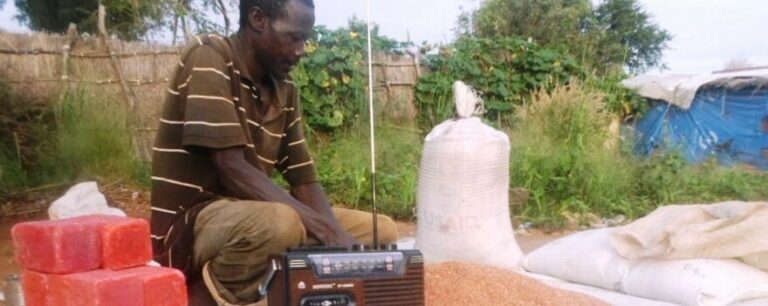Despite the allure of social media and other digital platforms, radio remains a trusted source of information. For many in Jonglei State and the Greater Pibor Administrative Area (GPAA), radio is hailed as a powerful tool for being at the forefront of mitigating evils that come with climate change.
Most parts of South Sudan have been hit by devastating floods since 2019. However, states like Unity, Jonglei, and Upper Nile, with their location in the Nile River Basin and low-lying topography, are particularly vulnerable.
Those who spoke to Radio Tamazuj on the occasion of World Radio Day, an international day celebrated on the 13 February each year, said while they felt neglected amidst ravaging floods in parts of Jonglei State and GPAA, radio remains a beacon of hope for them.
This year’s World Radio Day is celebrated under the theme “Radio and Climate Change: A Powerful Tool for Climate Action.”
Kenya Mach, a Bor resident, said this year’s theme speaks volumes of their state of affairs in Jonglei State.
“Climate change is real. In Jonglei, we are the worst affected because our state is low-lying and the soil is muddy,” she says. “Apart from the floods, we experience high temperatures at some points, and it is windy and dusty as we speak. We see this as effects of climatic change.”
Amid these difficult situations, Mach said radio has saved lives. “During the flooding in 2021 and 2022, I have personally been active on air advocating for aid for those affected and facilitating the evacuation of those stranded.”
In a nation where literacy rates are among the lowest globally, radio stands out as the most reliable and credible source of information.
Civil society activist Bol Deng Bol, the executive director of INTREPID South Sudan, says radio has amplified his voice.
“As a civil society actor, radio has helped in furthering my work and made my voice go where I have never been physically, ensuring that voices of those affected reached authorities during the flooding from 2019 to 2022,”
The activist hailed radio as a savior.
“Early warning has been a huge role that radio has been playing during flooding, ensuring that tough situations do not catch us by surprise, hence saving lives and livelihoods,” he states.
However, as we celebrate the achievements of radio, it is crucial to acknowledge its challenges. Unstable power supply, poor remuneration for broadcasters and other workers, media restrictions, and limited resources pose significant obstacles to fully realizing radio’s potential.
Activist Bol urged intervention for radio’s full potential to be realized.
“A gap in one area creates a gap in other areas, including civil society. Journalists need to be empowered, press freedom respected, and adequate funding be availed. If the USAID, whose funding for the media has been instrumental, is not coming back soon, then other agencies from Japan, China, the United Kingdom, and others should help fill the gap,” he urges.
For his part, Pochalla County Commissioner Otho Okoti, a former radio presenter, argues that radio has been and remains the only messenger amidst poor or lack of telecommunication services.
“During the flooding in Pochalla, our early warning messages and mitigation measures reached the public through radio,” he reminisces. “Recently, we used radio to ask people to move away from floods and protect themselves from waterborne diseases.”
As we celebrate this World Radio Day, calls have been made to support radio to promote climate literacy.
Jonglei State Information Minister Nyamar Lony admits that radio has been instrumental in bridging the gap between the government and citizens.
“In Jonglei State, we have several radio stations like Radio Jonglei, VOR, Peace FM, Maal FM, and Duk FM. These radio stations have been instrumental in amplifying our voices, ensuring messages on mitigation measures reach our people during the flooding,” she says.
However, all has not been rosy for radio.
“For us in the state, unstable power supply and lack of capacity building for radio operators have been a challenge,” Minster Lony explains. “As a ministry, we are working with our partners to fill this gap. Last December, we partnered with NCA and had a training for our journalists.”
Her GPAA counterpart, Jacob WErchum Jouk, agrees that radio has been instrumental as a tool in informing and educating on climate change.
“We have suffered from both floods and droughts, and there is no question about the role of radio,” he asserts. “We use it for risk communication and mitigation.”
In a separate statement on World Radio Day, Bol Deng Bol, Executive Director of INTREPID South Sudan (ISS) and chairperson of Jonglei Civil Society Network (JCSN) says the day reminds the world of the power of radio and the media.
“Radio, across South Sudan, has, to a larger extent, acted as a carrier of civic education, early warning, and an effective means of mass communication. It has highly contributed to fighting ignorance, hate speech, mis/disinformation and echoed voices on service gaps in our communities, including during flooding, communal conflicts,” he writes. “Most importantly, Radio has multiplied voices of reason, including voices of civil society actors. Even as we celebrate this day, we will not forget the radio presenters and journalists in general who have been pivotal in this resounding success.”
Deng contends that challenges such as capacity gaps and lack of protection for journalists still exist.
“I am therefore calling upon the government to uphold media laws and respect media independence and freedom,” he urges. “This will enhance their reach and operational quality and, by extension, improve civic and political space in our motherland.”




